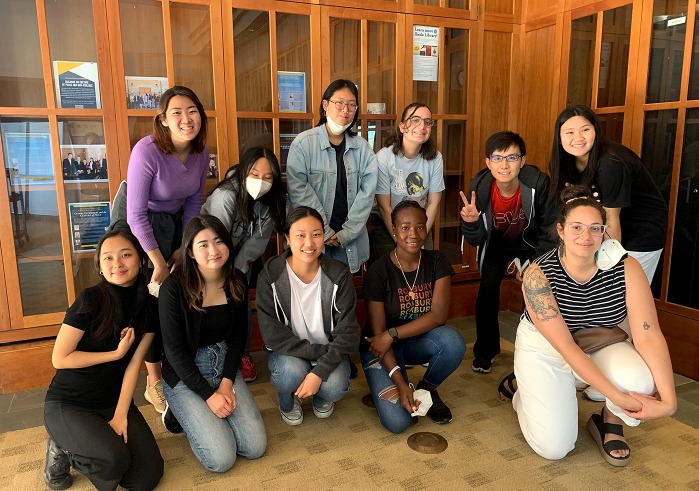Alternative Spring Break: Tackling a Global Issue Close to Home

This academic year, Soka students who wanted to volunteer during spring break didn’t travel to far-flung locations. They stayed much closer to home.
After months of learning about social justice and the issues around resettlement, students taking part in Alternative Spring Break (ASB) worked with the Tiyya Foundation to assist refugee families and communities in Los Angeles and Orange County.
In the years since a group of Soka students headed to New Orleans to join the disaster relief efforts after Hurricane Katrina, ASB has become a SUA tradition. It has developed into a co-curricular service-learning program that combines dialogue-based learning with volunteer service with various organizations.
The decision to focus on local groups came after numerous discussions about the goals of the program and a shift toward a more clearly defined social justice model, said Ruby Nagashima, assistant director of student leadership and service engagement.
“Developing a social justice model raised some questions, including how travel affects the impact students can make, and how much of a sustainable connection can be made far from campus,” said Nagashima, who began leading the program in 2019 after working on SUA’s residential life staff. “With a local organization, students can continue volunteering beyond just a week and SUA can develop more lasting relationships and partnerships with its community.”
Keeping the number of students accepted to ASB under 20—in previous years the group had swelled to more than 40—also supported the program’s tighter focus on social justice. A smaller number of students makes it easier to build trust and relationships among the students as they discuss issues around identity and other social justice topics, said Nagashima.
Once those decisions were made, Nagashima began reaching out to organizations in the area. She’d become aware of Tiyya a few years ago and connected with its co-founder, Meymuna Hussein-Cattan, on LinkedIn.
Dima and her daughter, Meymuna Hussein-Cattan, started the organization to provide the support they had needed as refugees from East Africa. Tiyya aims to build a network of support, including organizing access to economic opportunities and critical resources for immigrants, refugees, and displaced Indigenous communities. During the pandemic, Tiyya also launched Flavors from Afar, a catering business and restaurant in the Little Ethiopia neighborhood of Los Angeles. The social enterprise serves a menu created by a refugee chef and trains other refugee chefs.
After discussing ASB with Tiyya’s co-founders, Nagashima said they agreed the program would mutually benefit SUA’s students and the organization. An important component for Nagashima was deepening the ties between SUA and the organization, which included asking Tiyya’s founder and staff to lead some of the seminars students take throughout the academic year as part of ASB, providing context about its work.
They designed the program to have students work directly with people the organization supports and also assist with the operational, nuts-and-bolts work that is necessary to fulfill a nonprofit’s mission. “With behind-the-scenes work, they don’t get the appreciation personally, but sometimes it is more important for the organization than direct service,” said Nagashima.
In March, students headed to Tiyya’s offices to get to work. They wrapped donations and organized the delivery of toys, diapers, and other items to families; researched and created a local resource map; canvassed for job opportunities; and assisted with job placements.
Siena Taylor ’25 said the experience sharpened her awareness of the range of challenges refugees face in Southern California and around the world, including racism, discrimination, financial problems, PTSD, language barriers, and lack of education and job opportunities.
Working with Tiyya in different capacities also expanded her understanding of volunteering as part of global citizenship. “I was given the opportunity to explore direct service, research, advocacy, and education, which, in turn, pushed me to reframe how I view global-mindedness,” Taylor said. “Now I realize we can understand and support each other in a variety of ways.”
Saki Azuma ’24 agreed that her perspective on volunteering evolved during ASB. “My stance changed from ‘working for them’ to ‘working with them’,” Azuma said. “I was reminded how the people resettling are more than capable of taking care of themselves and contributing to society, they just need support and the connections to assist them in getting the resources they need to start their new life here. I definitely became more aware of the importance of always being willing to learn and also, unlearn our own biases.”
